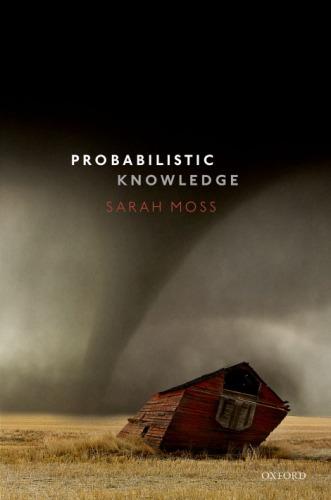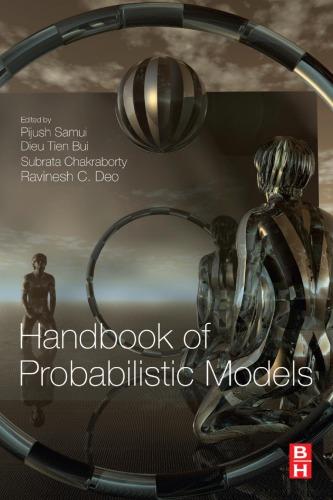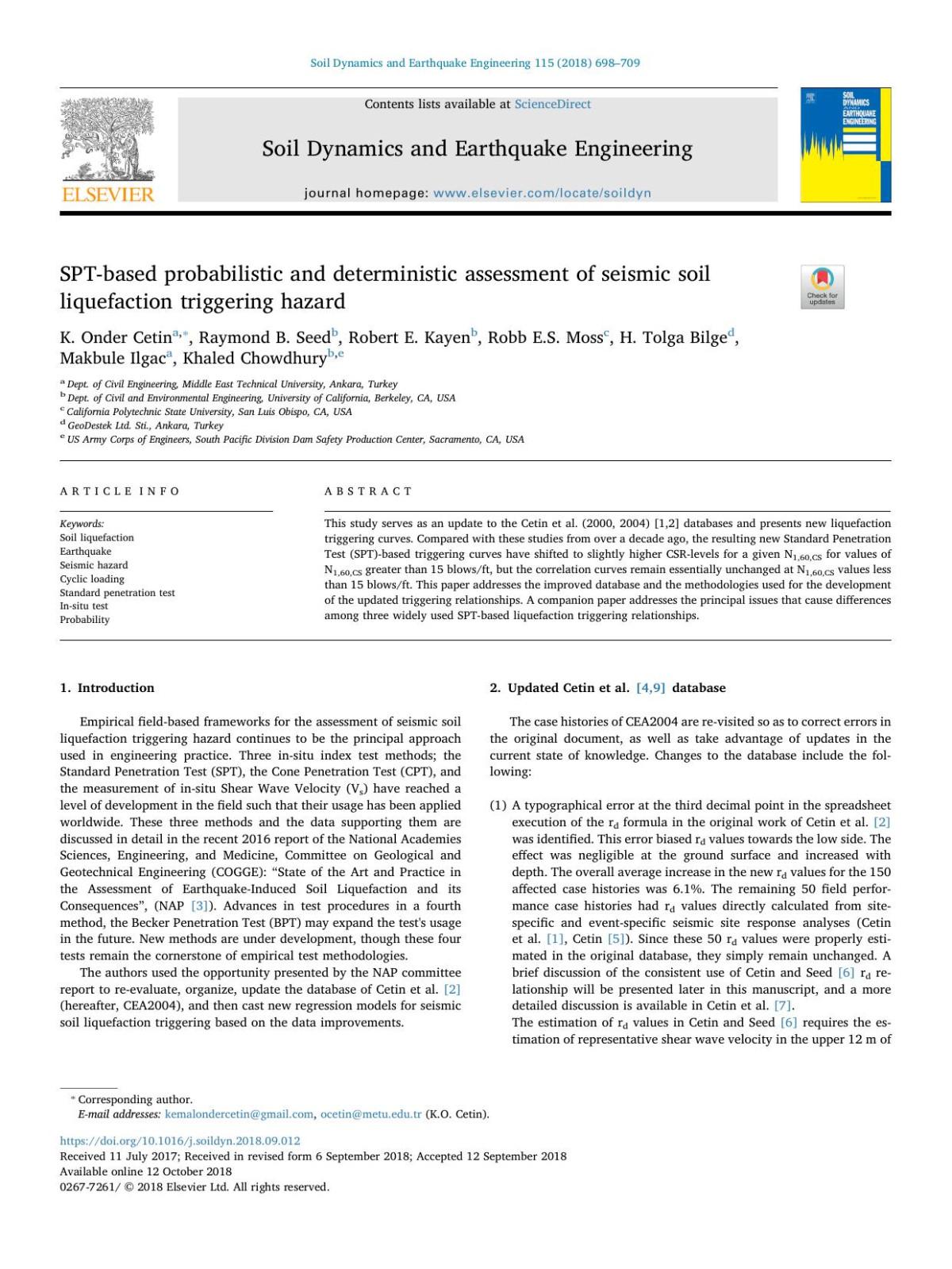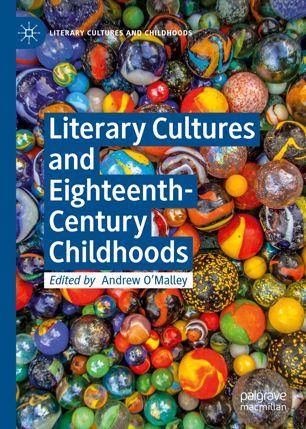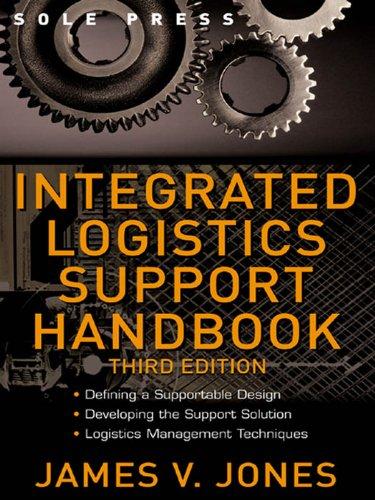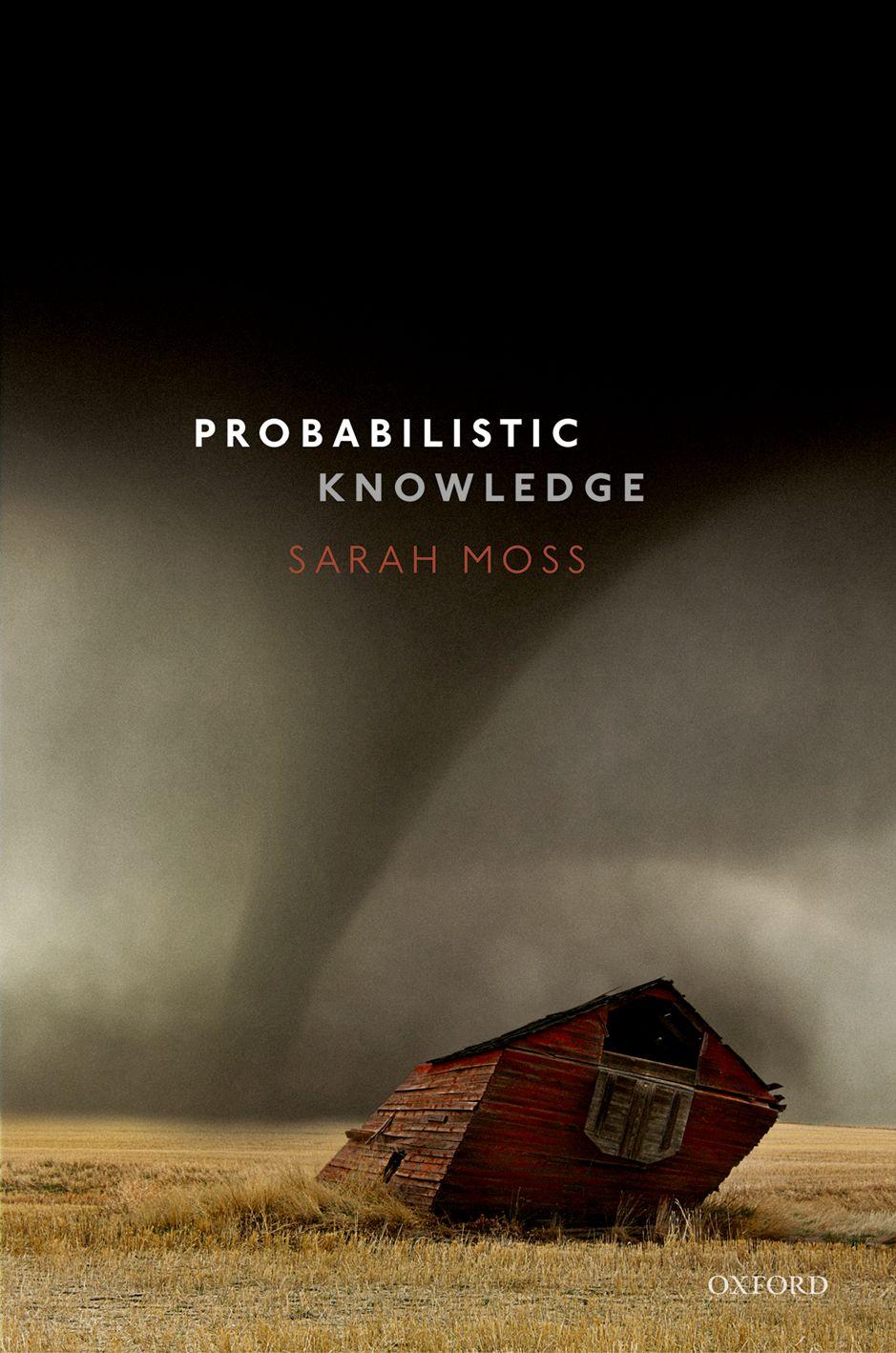Probabilistic Knowledge
SarahMoss
GreatClarendonStreet,Oxford,oxdp, UnitedKingdom
OxfordUniversityPressisadepartmentoftheUniversityofOxford. ItfurtherstheUniversity’sobjectiveofexcellenceinresearch,scholarship, andeducationbypublishingworldwide.Oxfordisaregisteredtrademarkof OxfordUniversityPressintheUKandincertainothercountries
©SarahMoss
Themoralrightsoftheauthorhavebeenasserted
FirstEditionpublishedin
Impression:
Allrightsreserved.Nopartofthispublicationmaybereproduced,storedin aretrievalsystem,ortransmitted,inanyformorbyanymeans,withoutthe priorpermissioninwritingofOxfordUniversityPress,orasexpresslypermitted bylaw,bylicenceorundertermsagreedwiththeappropriatereprographics rightsorganization.Enquiriesconcerningreproductionoutsidethescopeofthe aboveshouldbesenttotheRightsDepartment,OxfordUniversityPress,atthe addressabove
Youmustnotcirculatethisworkinanyotherform andyoumustimposethissameconditiononanyacquirer
PublishedintheUnitedStatesofAmericabyOxfordUniversityPress MadisonAvenue,NewYork,NY,UnitedStatesofAmerica BritishLibraryCataloguinginPublicationData
Dataavailable
LibraryofCongressControlNumber: ISBN––––
Printedandboundby
CPIGroup(UK)Ltd,Croydon,cryy
LinkstothirdpartywebsitesareprovidedbyOxfordingoodfaithand forinformationonly.Oxforddisclaimsanyresponsibilityforthematerials containedinanythirdpartywebsitereferencedinthiswork.
Formyguys—Eric,Liem,andOliverSwanson
.Thecaseforprobabilisticcontents .Probabilisticbeliefs .Anargumentforprobabilisticcontentsofbelief .Therolesplayedbycontentsofbelief .Fullbeliefs .Alternativerolesforcontentsofbelief
.Thecaseforprobabilisticassertion .Familiarargumentsagainstpropositionalcontentsofassertion .Foundationalargumentsforprobabilisticcontentsofassertion .Modelingcommunication .Epistemicmodalsandindicativeconditionals .Atestbatteryforprobabilisticcontent
.Epistemicmodalsandprobabilityoperators .Motivationsformysemantics .Embeddedepistemicvocabulary .Challengesforothertheories .Asemanticsforepistemicmodalsandprobabilityoperators .Asemanticsforsimplesentences .Therelationshipbetweencredenceandfullbelief .Indicativeconditionals .Probabilitiesofconditionalsasconditionalprobabilities .Asemanticsforconditionals .Whyprobabilitiesofconditionalsarenotconditionalprobabilities .Asemanticsforotherlogicaloperators .Thepragmaticsofepistemicvocabulary .Thecaseforprobabilisticknowledge .Thethesisthatprobabilisticbeliefscanbeknowledge .Testimony .Perception .Argumentsforprobabilisticcontentsofexperience .Othersourcesofknowledge .Justifiedtruebeliefwithoutknowledge .Traditionaltheoriesofknowledge .Analternativementalstate? .Applications
.Factivity .Alternativestoprobabilisticknowledge? .Thecontentsofknowledgeascriptions .Frequentlyaskedquestions .Relativism .Objectivechance
.Skepticism .Askepticalpuzzle .Theargumentfrominconsistency .Theargumentfromclosure .Theargumentfromdisjunction .Theargumentfromsafety
.Knowledgeandbelief .Theknowledgenormofbelief .Peerdisagreement .Applyingtheknowledgenormofbelief .Statisticalinference .Responsestoskepticismaboutperceptualknowledge .Knowledgeandaction .Knowledgenormsofaction .Addressingobjections .Applyingknowledgenormsofaction .Pragmaticencroachment .Transformativeexperience
.Knowledgeandpersons .Statisticalevidence .Anaccountoflegalproof .Applyingknowledgestandardsofproof .Racialandotherprofiling .Applyingtheruleofconsideration
Appendix:Aformalsemanticsforepistemicvocabulary
A.Background A.Epistemicmodalsandprobabilityoperators A.Simplesentences A.Indicativeconditionals A.Otherlogicaloperators
References
Preface
Thisbookarguesthatcredencescanbeknowledge.Sayyouhave.credence thatacertaincoinlandedheads,.credencethatyourfriendJonessmokes,and .credencethatyourfriendBrownsmokes.Iarguethateachofthesecredences canbeknowledge,injustthesamewaythatyourfullbeliefscanbeknowledge. Traditionalepistemologyhasfocusedontheepistemicstatusoffullbeliefsin propositions,suchasthepropositionthatyouarenotdreaming,orthatGod exists,orthatyouhavehands.Butinadditiontohavingknowledgeofblackand whitepropositions,wehaveknowledgethatcomesineveryshadeofgrey.
Thisbookisaboutcredences,butnotjustaboutcredences.Moregenerally, itisaboutprobabilisticbeliefs.Forinstance,Iarguethatyoucanknowthatit mightberainingoutside,wherethisepistemicmodalbeliefcannotbereducedto fullbeliefinanyproposition.Similarly,yourconditionalbeliefsandconditional credencescanbeprobabilisticknowledge.Also,thisbookisaboutknowledge,but notjustaboutknowledge—itisalsoaboutbeliefandassertion.Thereissomething commontocredences,epistemicmodalbeliefs,conditionalbeliefs,conditional credences,andsoon.Thecontentsoftheseattitudesaresetsofprobability spacesoverpropositions,or probabilisticcontents.Justastraditionholdsthatyou believeandassertpropositions,Iholdthatyoucanbelieveandassertprobabilistic contents.Henceprobabilisticcontentsplayacentralrolenotonlyinepistemology, butinthephilosophyofmindandthephilosophyoflanguageaswell.
Acceptingthatwecanbelieve,assert,andknowprobabilisticcontentshas significantconsequencesforawiderangeofcontemporarydebates.Forinstance, myargumentsaboutprobabilisticbeliefsupportanovelaccountoftherelationshipbetweenfullbeliefandcredence.AsIdefendtheclaimthatwecanassert probabilisticcontents,Idevelopanddefendaformalsemanticsforepistemic modalsandprobabilityoperators,aswellasaformalsemanticsforindicative conditionals.Alongtheway,Igiveargumentsthatchallengethecelebrated connectionbetweenindicativeconditionalsandconditionalprobability.Inlater chaptersofthebook,Idiscussseveralargumentsfortheclaimthatwecanperceive probabilisticcontents,includingargumentsinformedbyBayesianmodelsof humanvisualperception.Idevelopseveralknowledgenormsgoverningrational beliefandaction,includingnormsthathaveimplicationsforwhatyoushould believewhenyoufindoutthatyoudisagreewithanepistemicpeer.Ispellouta preciseinterpretationoftheclaimthattheresourcesofstandarddecisiontheory
areinadequatewhenitcomestodecisionsaboutwhethertohavetransformative experiences.IdefendperceptualdogmatismfromtheobjectionthatitisinconsistentwithBayesianprinciplesofrationalupdating.
Alongwithmanyphilosophicalquestions,probabilisticknowledgealsohelps usanswerquestionsofinteresttobroaderaudiences.Forinstance,acceptingprobabilisticknowledgeshouldpromptustorethinkcommonnegativeevaluationsof stereotypicallyfemalespeech.Probabilisticknowledgeplaysanimportantrolein legalstandardsofproof,suchasthestandardofproofbeyondareasonabledoubt. Thefactthatlegalproofrequiresprobabilisticknowledgeexplainswhymerely statisticalevidenceisinsufficienttolicensealegalverdictofguiltorliability. Finally,probabilisticknowledgecanbeusedtoexplainwhyactsofracialprofiling violatenotonlymoralnorms,butalsoepistemicnorms.Ihopethatinaddition tomovingmanyphilosophicaldebatesforward,thisbookwillalsohelpmove themoutward,byidentifyingpracticalandpoliticalproblemstowhichmycentral claimsmaybeusefullyapplied.
Somereaderswithlimitedtimemaybeinterestedinreadingselectedportions ofthebook.Epistemologistswillhitmanyimportanthighlightsbyreading chapter,sections.–,andchaptersthrough.Philosophersoflanguage willfinditusefultofocusonchapters–,chapter,andsections.–.For anyonewishingtoreadacondensedversionofthisbook,sayforonemeetingof agraduateseminarorareadinggroup,Irecommendsections.–,.,.,., and.–,withthepossibleadditionofsection.forreadersunfamiliarwiththe literatureonepistemicmodals,andsections.and.–forreadersinterested inpracticalapplicationsofprobabilisticknowledge.Themaintenchaptersof thebookareaccessibletoreaderswithnobackgroundinformalsemantics;the appendixisanadditionalchapterforlinguistically-mindedreaderswhowould likethisbooktoturnituptoeleven.
Someoftheideasinchaptersandofthisbookappearin“OntheSemantics andPragmaticsofEpistemicVocabulary,” SemanticsandPragmatics vol.,no. ().Someoftheideasinchapterappearin“EpistemologyFormalized,” PhilosophicalReview vol.,no.().Theothersevenchaptersarealmost entirelynew.Iamgratefultohavegottenfeedbackonmybookmanuscriptfrom avarietyofaudiences,includingthephilosophydepartmentsatHarvard,MIT, OhioState,Pittsburgh,Princeton,Purdue,RutgersUniversity–NewBrunswick, UniversityofCaliforniaatBerkeley,UniversityofNorthCarolinaatChapelHill, UniversityofSouthernCalifornia,UniversityofTexasatAustin,Universityof WisconsinatMadison,andYale.IhavealsobenefitedfromcommentsfromaudiencesattheworkshoponBayesianTheoriesofPerceptionandEpistemology atCornellUniversity,theLofotenEpistemologyConference,theNorthern
IllinoisUniversityGraduateConference,thePhilosophicalLinguisticsand LinguisticalPhilosophyWorkshop,theRutgersSemanticsWorkshop,the thSemanticsandLinguisticsTheoryConference,andtheUniversityof ChicagoLinguisticsandPhilosophyWorkshop.
Inadditiontothesegroups,manyindividualsprovidedmewithhelpfulcommentsonearlydraftsofmaterialinthisbook.Forhelpfuldiscussionandinsight, thankstoMariaAarnio,LizAnderson,AndrewBacon,GordonBelot,Catrin Campbell-Moore,FabrizioCariani,DaveChalmers,KeithDeRose,JoshDever, MarcelloDiBello,CianDorr,TomDougherty,DanielDrucker,JulienDutant, KennyEaswaran,AllanGibbard,AlexGuerrero,CasparHare,ScottHershovitz, JonathanJenkinsIchikawa,JimJoyce,EzraKeshet,JasonKonek,OfraMagidor, IshaniMaitra,DavidManley,JohnMorrison,JessieMunton,BobPasnau,Laurie Paul,RichardPettigrew,JimPryor,PeterRailton,HansRott,LauraRuetsche, JeffRussell,PaoloSantorio,MiriamSchoenfield,MarkSchroeder,MoritzSchulz, JanumSethi,TedSider,SusannaSiegel,AlexSilk,JuliaStaffel,JasonStanley, ZoltánSzabó,KatiaVavova,BrianWeatherson,RogerWhite,MalteWiller,Robbie Williams,andSethYalcin.Iamgratefultoseveralundergraduateandgraduate researchassistantswhoperformedvaluabledetectiveworkandtime-consuming copy-editingtasks:DavidBoylan,KevinCraven,DanielDrucker,SamiaHesni, ZoeJenkin,AllisonLang,AlexandraNewton,JonathanSarnoff,andJoeShin.The writingofthisbookwassupportedbyaCharlesA.RyskampResearchFellowship fromtheAmericanCouncilofLearnedSocieties,andbyaSummerWritingGrant fromtheADVANCEProgramattheUniversityofMichigan.
Anumberofpeopleweregenerousenoughtoreadnearlyallofthisbookas itwasinpreparation.IamgratefultothestudentsinmyFallgraduate seminar,whoenduredamuchlessfunversionofthemanuscriptwithtremendous enthusiasmandinsight.ThanksalsotoAndyEgan,BrandenFitelson,DanGreco, AlanHájek,JohnHawthorne,BrianHedden,DilipNinan,SusannaRinard, BobStalnaker,EricSwanson,andTimWilliamson,eachofwhomsignificantly influencedmychoicesaboutwhattoincludeinthisbookbycontributinginsights aboutmyargumentsandabouthowtobestpresentthem.
Finally,myfamilydeservesspecialthanks.Iamgratefultomysister,Katie Moss,whosepassionateandindefatigableworkasapublicdefenderinspiredmy interestinlegalstandardsofproof.IamgratefultoLiemandOliverforasteady supplyoflaughter.Aboveall,IamgratefultoEricSwanson,notonlyforreading thisbookbutforlivingwithitforthepastthreeyears.Heisaninspiration,both asaphilosopherandasaperson,andIknowwithcertaintythatIcouldnothave writtenthisbookwithouthissupport.
Thecaseforprobabilisticcontents
.Probabilisticbeliefs
Traditionaltheoriesofassertionandknowledgetrafficinfullbeliefs.Thatgrassis green,thatyouhavehands,thatyouarenotdreaming:thesearepropositionsyou canbelieve,assert,andknow.Inadditiontothesefullbeliefs,youhaveprobabilisticbeliefs.Youmayhave.credencethatacertaincoinlandedheads,forinstance. Youhavehighcredencethatyouhavehands,andyouhavelowcredencethatyou aredreaming.Howshouldourtheoriesofassertionandknowledgeincorporate theseprobabilisticbeliefs?Thisbookdefendsthreecentraltheses.Thefirstisa thesisinthephilosophyofmind:wecanbelieveprobabilisticcontents.Thesecond isathesisinthephilosophyoflanguage:wecanassertprobabilisticcontents.The thirdisathesisinepistemology:wecanknowprobabilisticcontents.
Forexample,sayyoubelieveyourfriendSmithsmokes,whileyouhave.credencethatJonessmokesand.credencethatBrownsmokes.Justasyourfull beliefthatSmithsmokescanbeknowledge,your.credencethatJonessmokes canbeknowledge,andsocanyour.credencethatBrownsmokes.Thesamegoes notjustforsimpleassignmentsofcredencebutformorecomplicatedprobabilistic beliefs,suchasyourbeliefthatJonesismorelikelytosmokethanBrown,your beliefthatitisbetween.and.likelythatJonessmokes,andtheconditional probabilityjudgmentthatifSmithsmokesthenitisfairlylikelythatJones doestoo.Theseprobabilisticbeliefscanallbeknowledge,namely probabilistic knowledge.
Thestartingassumptionofthisbookisthatwehave probabilisticbeliefs,thesort ofbeliefsthatarebestrepresentedusingprobabilityspaces. SayyouaskSmith, “Onascaleofonetoten,howlikelyisitthatJonessmokes?”andalso“Howlikely isitthatJones doesn’t smoke?”SupposeSmithsays“Nine!”bothtimes.Thenthere issomethingintuitivelywrongwithSmith.Thisintuitionisnaturallyexplainedby
1 Asexplainedin§.,mystartingassumptionthatwe haveprobabilisticbeliefs isdistinctfrom myfirstcentralthesisthatwe believeprobabilisticcontents.
theassumptionthatSmithhasbeliefsthatoughttoreflectthelawsofprobability, whichentailthatthenegationofalikelypropositionisunlikely.Thesamecan besaidwhenSmithbetsonlongoddsthatJonessmokesandthenalsobetsthat shedoesn’t.Inmanyordinarysituations,ourdecisionsareinformedbycertain sortsofopinions,thesortsofopinionsthatBayesianepistemologistsareinthe businessofstatingnormsfor.AccordingtoBayesiantradition,theseopinionsare bestrepresentedusingprobabilityspaces.
Awordofcaution:theprobabilisticbeliefsthatIhavebeentalkingaboutare notfullbeliefsinpropositionsaboutprobabilities.Forinstance,theyarenot merelyfullbeliefsaboutwhatislikelygivenyourevidence.Theyarenotfull beliefsaboutobjectivechancefacts.Assomemightputit,yourprobabilistic beliefsincludeyourpartialbeliefs,degreesofbelief,degreesofconfidence,or subjectiveprobabilities.Thesesortsofbeliefsstandapartfromyourfullbeliefs, oroutrightbeliefs.Thesimplestexamplesofprobabilisticbeliefsarecredences, whicharesubjectiveprobabilitiesmeasuredonascalefrom0to1.Inaddition tocredences,though,youalsohavemorecomplicatedprobabilisticbeliefsthat superveneonyourcredences.Whenyouhave.credencethatJonessmokesand .credencethatBrownsmokes,forinstance,yourcredencestherebyhaveanother property,namelyassigninghigherprobabilitytoJonessmokingthanBrown.To putitanotherway,whenyoubelievethatitis.likelythatJonessmokesandthat itis.likelythatBrownsmokes,youtherebybelievethatJonesismorelikelyto smokethanBrown.Thisseconddescriptionofyourthreebeliefsmaysoundlike itisdescribingfullbeliefsaboutprobabilitiesofsomesortorother.Butonthe theoryofprobabilityoperatorsdefendedinthisbook,itisjustanotherwayof describingyourcredencesandyourcomparativeprobabilisticbeliefs.
Someofmycentralthesesaremoreradicalthanothers.Thethesisthatwecan assertprobabilisticcontentsisarguablymoreradicalthanthethesisthatwe canbelieveprobabilisticcontents,andthethesisthatwecanknowprobabilistic contentsismoreradicalstill.Accordingly,themajorityofthisbookisdedicated todefendingprobabilisticassertionandprobabilisticknowledge.Idefendthese twothesesusingindependentargumentsforeachthesis,aswellasconditional argumentsforeachthesisthatpresupposetheotherthesis.Theresultingprobabilistictheoriesofassertionandknowledgearelogicallyindependent,butthey arestrongestwhenacceptedasapackage.
2 A probabilityspace isanorderedtripleconsistingofadomainofpossibilities,analgebraof propositions,andaprobabilitymeasuredefinedontheelementsofthatalgebra.Formoredetailed discussion,see§..
Thecentralthesesofthisbooknotonlysupporteachother,butalsosupportmy startingassumptionthatwehaveprobabilisticbeliefs.Anumberoftheoristshave recentlyarguedthatwedonothaveanyprobabilisticbeliefssuchascredences. Forsome,skepticismaboutcredencesmightbemotivatedbythethoughtthat thecontentsofbeliefmustbepotentialcontentsofassertion,togetherwiththe thoughtthatonlythecontentsoffullbeliefsarefitforassertion.Forothers, skepticismismotivatedbythethoughtthatthecontentsofbeliefarethesortof contentsthatcanbeknowledge,togetherwiththethoughtthatonlyfullbeliefs canbeknowledge.Forinstance,Holtonencouragesskepticismabout credencesbysayingthat“abeliefiseitherapieceofknowledgeorafailedattempt atknowledge ... Butsinceknowledgeisitselfanall-outstate,thisonlyaddsto theforceofwhatissaidhere,”namelythat“wecannotformcredencesatall”(). Theseargumentsagainstcredencesareunderminedbymydevelopmentoftheoriesofassertionandknowledgeinwhichcredencesplayacentralrole.Knowledge maybefirst,asWilliamsonwouldsay.Butthatdoesnotmeanthat credenceshavetobesecond.
Inthischapter,Iargueformyfirstcentralthesis:wecanbelieveprobabilistic contents.In§.,Iarguethatprobabilisticcontentsplaycertaintheoreticalroles traditionallyassignedtocontentsofbelief.In§.,Idefendmyassumptionthat thecontentsofbeliefareindeedtheobjectsthatplaytheseroles.In§.,Idiscuss therelationshipbetweenfullbeliefandprobabilisticbelief.In§.,Iadaptmy argumentsforreferentialistandrelationisttheoriesofbelief,andIdiscusstheories of dese beliefaccordingtowhichnoonesortofcontentplaysalloftheroles mentionedin§..Inshort,thischapterdiscussesseveralfoundationaldebates aboutcontent,motivatingprobabilisticcontentsofbeliefforabroadrangeof positionsinthesedebates.
.Anargumentforprobabilisticcontentsofbelief
Thestartingassumptionofthisbookisthatwehaveprobabilisticbeliefs.The firstcentralthesisofthisbookconcernsthenatureofthesebeliefs.Whatsorts ofobjectsarethecontentsofprobabilisticbeliefs,andwhatsortsofattitudes dowehavetowardthesecontents?WhatIhavesaidsofarisconsistentwith twodifferentaccounts.Supposethatyouhave.credencethatJonessmokes. Thiscouldbeacomplexattitudewithasimplecontent.Thecomplexattitude is believingtodegree..ThesimplecontentisjustthepropositionthatJones smokes.Alternatively,yourprobabilisticbeliefcouldbeasimpleattitudewitha complexcontent.Thesimpleattitudeisjusttheattitudeof believing.Thecomplex contentisthecontentthatitis.likelythatJonessmokes.Thiscontentisnot
thecaseforprobabilisticcontents
aproposition,butaprobabilisticcontent.Bydefinition,a probabilisticcontent isasetofprobabilityspaces.Forexample,thecontentthatitis.likelythat Jonessmokesisthesetcontainingjustthoseprobabilityspaceswithmeasures thatassign.tothepropositionthatJonessmokes.Thefirstcentralthesisof thisbookstatesthatthecomplexcontentaccountiscorrect.Thecorrectanalysis ofprobabilisticbeliefsrequiresenrichingthecontentsofbelief,asopposedto enrichingtheattitudesthatwehavetowardthesecontents.
Theopposingcomplexattitudeaccountiscommonlypresupposedindiscussionsofprobabilisticbelief.Forexample,Hájeksaysthat“totheextent thatasentenceisappropriatetobethecontentofabelief-likeattitude(suchas adegreeofbelief),itmusthavetruthconditions,andtheattitudeconcernsthose conditionsbeingmet”().Hájekassumesthattohavevariouscredencesisto havevarious belief-like attitudes,distinctfromthesimpleattitudeofbelief.In additiontotheoristslikeHájekwhoarefriendlytocredences,thecomplexattitude accountisalsopresupposedbysomeskepticsaboutcredences,astheyargue thatthecomplexattitudeaccountdoesnotdescribeanyattitudesthatordinary subjectsactuallyhave.Forexample,Holtonassumesthataccordingto thecredencepicture,“ourbeliefsareessentiallyprobabilistic.Thisisbecause probabilityis ... intheattitudeofbeliefitself”().Thesyntacticstructureof credenceascriptionsencouragesthiswayofthinking.Whenwesaythatyouhave .credenceinacertainproposition,wementionasimplecontent,andweappear tosaythatyouhavesomecomplexattitudetowardit.
Atfirst,thecomplexattitudeaccountmayappearsimplerthanthecomplex contentaccount,sincetheformercanrepresentyour.credencewithoutappealingtoanythingasstructuredasasetofprobabilityspaces.Thisappearanceof simplicityfadesaway,though,whenweconsidermorecomplexprobabilistic beliefs.Forexample,supposethatyouhavehighercredencethatJonessmokes thanthatBrownsmokes,conditionalonSmithsmoking.Incolloquialterms,you believethatifSmithsmokes,thenitismorelikelythatJonessmokesthanthat Browndoes.Onthecomplexcontentaccount,youhaveabeliefwithaprobabilisticcontent,namelythesetofprobabilityspacesthatassignhigherprobability toJonessmokingthanBrown,conditionalonSmithsmoking.Onthecomplex attitudeaccount,yourattitudeismuchmorecomplicated.Justasyour.credence isanattitudewithonesimplecontent,yourconditionalbeliefisanattitude
3 ForreadersofHolton,Ishouldflaganimportantterminologicaldifference.Holtonuses ‘probabilisticcontent’forpropositionsaboutprobabilities.Ihavenotadoptedhisterminology.As Iseeit,propositionsaboutprobabilitiesarenotprobabilisticcontents,anymorethanpropositions aboutnepotismarenepotisticcontents.Ireservetheterm‘probabilisticcontents’forsetsofprobabilityspaces.
anargumentforprobabilisticcontentsofbelief withthreesimplecontents.Justasyoucanhavethe“believingtodegree.” attitudetowardonecontent,youwillhavethe“believingthatthefirstismore likelythanthesecond,giventhethird”attitudetowardthethreepropositional contentsofyourconditionalbelief.Thereareanunlimitednumberofbelieflikeattitudes,manydeterminingdifferentasymmetricrelationsbetweentheir contents.Forexample,thereisanattitudeofbelievingthatthefirstcontentofyour attitudeisthreetimesaslikelyasthesecondcontent,giventhateitherthethird contentisatleast.likelyorthefourthcontentislesslikelythanthefifth.And soon.Justlikethesimpleattitudeaccount,thecomplexattitudeaccountmust appealtostructuredentitiesinordertoexplainwhatitmeanstohavecertain probabilisticbeliefs.Onthecomplexattitudeaccount,therelevantstructured entitiesarethe“belief-like”attitudes.
Iftherivalaccountsofprobabilisticbeliefareequallycomplicated,whyendorse thecomplexcontentaccount?Therearetwopremisesthattogetherentailthethesisthatthecontentsofbeliefcanincludeprobabilisticcontents.Thefirstpremise isthatthecontentsofbeliefjustarewhateverobjectsplaycertaintheoreticalroles. Thesecondpremiseisthatprobabilisticcontentsplaythoseroles.Intherestofthis section,Ioutlinefourtheoreticalrolesthataretraditionallyascribedtocontents ofbelief,andIarguethatprobabilisticcontentsplayallofthem.
Thefirstroleplayedbycontentsofbeliefconcernsexplanationsofaction.The factthatagentsbelievethesamecontentoftenhelpsexplainwhythoseagents actthesameway.ThefactthatJonesandSmitheachopenuptheirumbrellasis explainedinpartbythefactthattheybelievethesamecontent,namelythatitis raining.ThefactthatLoisLanelooksupandsearchestheskyonseveraloccasions maybeexplainedinpartbythefactthatshebelievesthesamecontentonallthose occasions,namelythatSupermanisflyingthroughtheskyaboveher.Formany theorists,explainingactionispartofthejobdescriptionforthenotionofcontent theyareinterestedin.Forinstance,Block“simplyassumesthattherationale fornarrowcontentis(causal)psychologicalexplanation,”andobservesthatthis is“howthenotionofnarrowcontenthasgenerallybeenunderstood,bothbyits proponentsandopponents”().
Inadditiontotheoriesaboutrelationsbetweenbeliefandaction,contents ofbeliefplayimportantrolesintheoriesaboutrelationsbetweenbeliefs.For instance,atafirstpass,subjects agree aboutsomethingjustincasetheybelieve
4 Forsimilarassumptions,seeFodor,Loar,andStalnaker.Acontrasting notionofbeliefcontentisdiscussedby referentialists suchasNathanSalmonandScottSoames. ReferentialistssaythatSupermanbeliefsandClarkKentbeliefshavethesamecontent,andaccordinglydenythatbeliefcontentsplayanyofthetheoreticalrolesdescribedinthissection.Forfurther discussionofreferentialism,see§..
thecaseforprobabilisticcontents
thesamecontent,and disagree justincasetheybelieveinconsistentcontents. MacFarlaneelaborates:“Askedwhatdisagreementis,Isuspectmany philosophers’firstanswerwillbewhatwemightcallTheSimpleViewofDisagreement.Todisagreewithsomeone’sbeliefthat p istohavebeliefswhosecontents arejointlyincompatiblewith p”().SupposethatJonesandSmitharestanding togetherinthemiddleofHarvardSquare.Jonesbelievesthatsomenearbybar servescoffee,andSmithbelievesthatcoffeeisnotservedinanynearbybar. AccordingtotheSimpleView,thefactthatJonesandSmithdisagreeisexplained bythefactthattheybelieveinconsistentcontents.Supposethatmilesawayin Boston,Brownbelievesthatsomenearbybarservescoffee.SmithandBrowndo nottherebydisagreeaboutanything.AccordingtotheSimpleView,thefactthat theydonotdisagreeisexplainedbythefactthattheybelieveconsistentcontents.
Athirdtheoreticalroleforcontentsofbeliefconcernsrelationsbetweenbeliefs heldbyonesubjectatdifferenttimes.Atafirstpass,you changeyourmind just incaseyoubelievesomecontentatonetimeandlaterbelievesomecontentthat isinconsistentwithit.Inotherwords,youchangeyourmindwhenyoudisagree withyourearlierself.SmithintuitivelychangeshismindifJonesconvinceshim thatsomenearbybarservescoffee,sincethenthecontentsofhisearlierandlater beliefsareinconsistent.Bycontrast,Smithdoesnotchangehismindifhetravels toBostonandthencomestobelievethatsomenearbybarservescoffee,since hisHarvardSquarebeliefandhisBostonbeliefhaveconsistentcontents.Justlike factsaboutdisagreement,intuitivefactsaboutchangingyourmindaregrounded infactsaboutthecontentsofbeliefs.
Finally,inadditiontorelationsbetweenbeliefsheldbydifferentsubjectsand beliefsheldatdifferenttimes,contentsofbeliefplayanimportantroleingroundingrationalrelationsbetweenbeliefsheldbyonesubjectatonetime.Forinstance, idealrationalitydemandsthatyourbeliefsbeconsistent.Atafirstpass,your beliefsareconsistentjustincasetheyhaveconsistentcontents,andinconsistent justincasetheyhaveinconsistentcontents.Inotherwords,rationalitydemands thatyoudonotdisagreewithyourself.Similarly,idealrationalitymaydemand thatyourbeliefsbeclosedunderentailment,wherethisrelationbetweenbeliefs isgroundedinentailmentrelationsbetweentheircontents.Forinstance,ifJones believesthatsomenearbybarservescoffee,thenshemayberationallyrequired tobelievethatatleastonebarservescoffee,sincethecontentoftheformerbelief entailsthecontentofthelatter.
Ihavedescribedfourtheoreticalrolesplayedbythecontentsofbelief.Eachof theserolescanbeplayedbyprobabilisticcontents.Forstarters,thefactthatagents believethesameprobabilisticcontentcanhelpexplainwhythoseagentsactthe sameway.JonesandSmithmayeachgrabanumbrellaastheyleavethehouse
anargumentforprobabilisticcontentsofbelief simplybecausetheyeachhave somefairlyhighcredence thatitwillrain.Iftheyact thesamewayinvirtueofbelievingthesamecontent,thenthiscontentmustbea probabilisticcontent,namelythesetofprobabilityspacesthatassignsomefairly highprobabilitytothepropositionthatitwillrain.LoisLanemaylookupand searchtheskysimplybecauseshehas atleast.credence thatSupermanisflying aboveher.Ifshesearchestheskyinvirtueofbelievingacertaincontent,thenthis contentmustbeaprobabilisticcontent,namelythesetofprobabilityspacesthat assignatleast.probabilitytothepropositionthatSupermanisflyingaboveher.
CoulditbethatultimatelyJonesandSmitheachgrabanumbrellaonlyinvirtue ofsharingsomefullbeliefinacertainproposition?Tospellouttheintended examplemorecarefully,wemaysupposethatJonesandSmithareagnosticabout whetheritwillrain,neitherbelievingthiscontentnoritsnegation.Inaddition, supposethatJonesandSmithdonothaveanyhigher-orderbeliefsabouttheir evidence,andhence afortiori theydonothaveanycommonbeliefsaboutwhat theirevidencesupports.Couldthereneverthelessstillbesomeotherproposition thatbothJonesandSmithbelieve?Couldtherebesomepropositionbelievedby allandonlythosesubjectswhoactasiftheyhaveafairlyhighcredencethat itisgoingtorain?Couldtheircommonfullbeliefinthispropositionexplain whythesesubjectsgoaroundgrabbingumbrellas,cancelingpicnics,andmore generallydoingwhateveractionswouldhavehighestexpectedutilityforthemif theyhadafairlyhighcredencethatitwasgoingtorain?
Imagineaworldwithtwodemi-gods.Thedemi-godsbelieveexactlythe samepropositions.Everypropositionthattheybelieveistrue,andtheybelieve almosteverytrueproposition.Inparticular,onlytwoworldsarepossiblegiven whatthedemi-godsbelieve.Inexactlyoneoftheseworlds,itwillrainlater. Althoughthedemi-godsbelievethesamepropositions,theydonothavethe sameprobabilisticbeliefs.Thefirstassigns.credencetotherainyworldand .credencetothesunnyworld.Thesecondassigns.credencetotherainyworld and.credencetothesunnyworld.Accordingly,onlythefirstdemi-godgrabsan umbrellabeforeleavingthehouse.Thereisnopropositionbelievedbyonlythe demi-godwithafairlyhighcredencethatitwillrain.Thefactthatthedemi-gods actdifferentlyisnotexplainedbythefactthattheybelievedifferentpropositions, butbythefactthattheybelievedifferentprobabilisticcontents.
5 Somehavearguedthatpropositionsmustbetrueatcenteredworldsiftheyaretoplaytheir intendedroleinactionexplanations.Foramoredetaileddiscussionof dese beliefcontents,see§..
6 Thecaseofthetwodemi-godsisintendedtoresemblethecaseofthetwogodsfromLewis a.Ifmycaseseemsmoreobjectionable,notethatonemaysupposethatthedemi-gods themselvesarejustthegodsthatLewisdescribes,inhabitingcenteredworldsthatdifferwithrespect towhetheritwillrainlateratthelocationofthecenter.
Thecaseofthedemi-godsisafancifulillustrationofanimportantmoral. Becausecredencesstandapartfromfullbeliefsinpropositions,thelatteropinions cannotalwaysbesubstitutedfortheformerinexplanationsofaction.Tostatea moreseriousargumentinasimilarspirit:probabilisticbeliefsfigureinintuitive explanationsofactionunderconditionsofuncertainty.Inexplainingactions,one maysometimescharitablyinterpretagentsasactingonfullbeliefsinaccordance withprinciplesofinstrumentalreasoning.Butonemaysometimescharitably interpretagentsasactingonprobabilisticbeliefsinaccordancewithprinciples ofstandarddecisiontheory.Insofarasyouractionsareexplainedbyappealingto thecontentsofyourbeliefs,decision-theoreticexplanationsofyouractionsmust appealtoprobabilisticcontentsofbelief.
Probabilisticcontentsalsoplayimportantrolesintheoriesofagreementand disagreement.Theexpression‘peerdisagreement’isroutinelyusedtodescribe subjectswithdifferentcredencesinpropositions,andthisisnotsomeunfortunate misnomer.SupposethatSmithhas.credencethatJonessmokesandBrownonly has.credencethatJonessmokes.SmithandBrownagreethatitisatleast.likely thatJonessmokes.ButSmithandBrownalsointuitivelydisagreeaboutsome questions.Forexample,theydisagreeaboutwhetheritisatleast.likelythat Jonessmokes.IfSmithandBrowndisagreejustincasetheybelieveinconsistent contents,thenthesecontentsmustbeprobabilistic.Smithbelievesthesetof probabilityspacesthatassignatleast.probabilitytothepropositionthatJones smokes,forinstance,andBrowndoesnot.
CoulditbethatultimatelySmithandBrowndisagreeonlyinvirtueofbelieving inconsistentpropositions?IfSmithandBrownhaveexactlythesameevidence, forinstance,thentheymightdisagreeaboutsomepropositions,namelypropositionsaboutwhattheirsharedevidencesupports.Inordertoisolatethesortof disagreementIamconcernedwith,wemaysupposethatSmithandBrowndonot haveanydisagreementofthiskind.SupposethatSmithandBrownagreeabout exactlywhatcredencesaresupportedbyanyparticularbodyoftotalevidence. SmithandBrownmayneverthelessendupwithdifferentcredencesthatJones smokes,namelyinvirtueofhavingdifferentevidenceattheirdisposal.Thereis anintuitivesenseinwhichSmithandBrowntherebycountasdisagreeingabout thelikelihoodthatJonessmokes.Infact,SmithmaydisagreewithBrownevenif hebelievesthatBrownhasperfectlyrationalcredencesgivenhertotalevidence, namelybecauseSmithbelievesthatBrown’stotalevidenceismisleading.The senseinwhichSmithandBrowndisagreesimplyinvirtueofhavingdifferent credencesisthesensethatisrelevantasyouareformingyourowncredencethat Jonessmokes.Itisthesenseinwhichyoumustpicksides,thesenseinwhichyou cannotagreewiththemboth.
Inadditiontogroundingrelationsofagreementanddisagreement,probabilistic contentsgroundrelationsbetweenyourbeliefsovertime.Inshort,thereisan intuitivesenseinwhichchangingyourcredenceischangingyourmindabout something.AsBlockputsit,“whatcorrespondstochangeofmindinthe Bayesianperspectivejust is changeofdegreeofbelief”().Supposethatyou have.credencethatJonessmokesandthenyoucometohave.credencethatshe smokes.Thenintuitively,youhavechangedyourmindaboutsomething.Asyou mightputit,firstyoubelievethatJonesprobablysmokes,andthenyoubelieveshe probablydoesn’t.Ifchangingyourmindjustamountstobelievinginconsistent contentsatdifferenttimes,thenchangingyourmindbychangingyourcredence amountstobelievinginconsistentprobabilisticcontentsatdifferenttimes.
Finally,probabilisticcontentsplayanimportantroleingroundingrational relationsamongyourbeliefsatagiventime.Justasidealrationalitydemands thatyourfullbeliefsbeconsistent,thesamegoesforyourprobabilisticbeliefs. Forinstance,itisinconsistenttohave.credencethatJonessmokeswhilealso having.credencethatshedoesn’t.Ifhavinginconsistentbeliefsjustamounts tobelievinginconsistentcontents,thenhavingtheseinconsistentprobabilistic beliefsamountstobelievinginconsistentprobabilisticcontents,namelythesetof probabilityspacesthatassign.probabilitytothepropositionthatJonessmokes andthesetofprobabilityspacesthatassign.probabilitytoitsnegation.Similarly, supposethatyouhave.credencethatJonessmokesand.conditionalcredence thatBrownsmokesifJonesdoes.Thenidealrationalitymayrequireyouto haveatleast.credencethatBrownsmokes.Onthecomplexcontentaccount, thisrationalrequirementhasanelegantandfamiliarexplanation,namelythat thecontentsofthefirsttwobeliefsentailthecontentofthethird.Evensetting asiderequirementsofidealrationality,supposeyoustartwithsomejustified credencesandthencompetentlyreasonyourwaytoothers.Onthecomplex contentaccount,yourresultingcredencesarejustifiedforexactlythesamereason thatfullbeliefsarejustifiedbyinference,namelybecauseyouarejustifiedin believingcontentsthatyoucompetentlydeducefromothercontentsthatyou justifiedlybelieve.
Tosumupwherewestand:thecontentsofbeliefaretraditionallyassumedto playvarioustheoreticalroles,suchasexplainingrationalaction,orgrounding relationsofdisagreementorinconsistencybetweenbeliefs.Theseclaimsabout therolesplayedbycontentsofbeliefareusuallytakentoilluminatetheoretical notions,suchaswhatconstitutesrationalaction,disagreement,orinconsistency betweenbeliefs.Butinsofaraswehavesomeindependentgraspofthesetheoreticalnotions,thesameclaimscanbeunderstoodtoilluminatethenotionof contentitself.Havingtakenthisturn,wehaverepeatedlyseenthatthetheoretical
thecaseforprobabilisticcontents
rolesforcontentsofbeliefcanbeplayednotonlybypropositions,butalsobysets ofprobabilityspacesoverpropositions.Toputthepointanotherway,thereare indeedwell-establishedcredence-basedtheoriesofrationalaction,disagreement, andinconsistencybetweenbeliefs.Wecanusethesetheoriestoidentifythe contentsofprobabilisticbeliefs.Whenwedo,wefindthatthecomplexcontent accountiscorrect.Probabilisticbeliefsarebeliefswithprobabilisticcontents.
.Therolesplayedbycontentsofbelief
Thesimplestobjectiontomy§.argumentforprobabilisticcontentsofbelief comesfromthesteadfastadvocateofthecomplexattitudeaccount.According tothisobjection,thetheoreticalrolesdescribedin§.canindeedbeplayed bysomethingotherthanpropositions.However,thatdoesnotmeanthatthe contentsofbeliefcanbeanythingotherthanpropositions.Rather,itmeansthat thetheoreticalrolescanbeplayedbysomethingotherthanthecontentsofbelief. Forexample,accordingtothesteadfastadvocateofthecomplexattitudeaccount, itisfalsethatsubjectsagreeaboutsomethinginvirtueofbelievingthesame content.Instead,subjectsagreeinvirtueofbearingthe samebelief-likeattitude towardsomepropositionalcontentorcontents.
Formanytheorists,itisanalyticthatthecontentsofbeliefplaysomeorallof therolesdescribedin§..Accordingly,thesetheoristsshoulddismisstheabove objectionasmisguided.Ifitisanalyticthatsubjectsdisagreejustincasethey believeinconsistentcontents,forinstance,theninordertoargueforthecomplex contentaccount,itsufficestoarguethatsubjectscandisagreeinvirtueofhaving differentcredencesinaproposition.Butletmegrantforsakeofargumentthat itisnotanalyticthatthecontentsofbeliefplaythetheoreticalrolesmentioned above.Isthereasubstantivedisputeremainingaboutwhethercredencesare probabilisticattitudeswithsimplecontents,orsimpleattitudeswithprobabilistic contents?Atfirstglance,thedifferencebetweentheseaccountsmayappeartobea meredifferenceinbookkeeping.However,althoughtheaccountsareempirically equivalent,therearetheoreticalreasonstopreferthecomplexcontentaccount. Thecomplexcontentaccounthasexplanatoryvirtuesthatthecomplexattitude accountdoesnot.Thesevirtuesarenotdecisiveevidenceforthecomplexcontent account,buttheyaresignificantenoughtomeritmentionhere.
Forstarters,thecomplexcontentaccountcanmakeuseofasignificantfact aboutprobabilisticcontents,namelythattheycanstandinjustthesamelogical relationsaspropositions.Forinstance,setsofprobabilityspacesareconsistentjust incasethereissomeprobabilityspaceintheirintersection.Theyareinconsistent justincasetheyaredisjoint.Someprobabilisticcontentstogetherentailanother
probabilisticcontentjustincasetheintersectionoftheformerisasubsetofthe latter.Againstthisbackground,thecomplexcontentaccountprovidesanexplanatorytheoryofrationalrelationsbetweenbeliefs.Itisrationallyinconsistentto have.credencethatJonessmokesand.credencethatshedoesn’t.Accordingto thecomplexcontentaccount,theseprobabilisticbeliefsareinconsistentbecause theircontentsareinconsistent,andtheircontentsareinconsistentinvirtueofthe factthattheyaredisjointsetsofprobabilityspaces.Thesamegoesforthefact thatitisinconsistenttohave.credencethatJonessmokesand.conditional credencethatBrownsmokesifJonesdoes,andyethavemerely.credencethat Brownsmokes.Bycontrast,accordingtothecomplexattitudeaccount,these probabilisticbeliefsareinconsistentbecausetheyareinstancesofinconsistent attitudes.Isitaprimitivefactthattherelevantattitudesareinconsistent?Ifthe inconsistencyofvariousbelief-likeattitudesisnotgroundedinsimilarlysimple factsaboutthoseattitudes,thenthecomplexcontentaccountprovidesamore satisfyingexplanationoftheinconsistencyofthesebeliefs.
Thisexplanatorychallengeforthecomplexattitudeaccountresemblesone interpretationoftheFrege-Geachproblemfornoncognitivistaccountsofmoral language. JustasitisinconsistenttobelievethatJonessmokingisbothlikely andunlikely,itisinconsistenttobelievethatmurderisbothpermissibleand impermissible.Accordingtomoraldescriptivists,thesebeliefsareinconsistent becausetheircontentsareinconsistent—thatis,becausethereisnoworldwhere bothoftheircontentsaretrue.Accordingtononcognitivists,bycontrast,the beliefsareinconsistentbecausetheycorrespondtoinconsistentattitudes,such astheattitudesoftoleranceanddisapproval.Schroederaarguesthat noncognitivistsfaceanexplanatorychallengethatmoraldescriptivistsdonot face.AsSchroederputsit,“toleranceofmurderanddisapprovalofmurderaretwo distinct andapparently logicallyunrelated attitudestowardthe same content,”and thereforethenoncognitivistmustansweranadditionalquestion:“whyonearthis itinconsistenttoholdthemtowardthesamething?”().Themoraldescriptivist claimstogiveamoresatisfyingaccountoftheinconsistencyofcertainmoral beliefs.Absentanyreductiveaccountoftheinconsistencyofvariousbelief-like attitudes,onemightpreferthecomplexcontentaccountofprobabilisticbeliefon similargrounds.
Thecomplexcontentaccountnotonlyexplainsinconsistencyrelationsamong probabilisticbeliefs,butalsoallowsustogiveaunifiedexplanationofinconsistencyrelationsamonginstancesofvariousbelief-likeattitudes.Beliefitselfis
7 Schroederbprovidesasurveyofliteraturedevelopingthisinterpretation,including Hare,Hale,Unwin,andSchroedera.
thecaseforprobabilisticcontents
abelief-likeattitude.ItisinconsistenttobelievethatJonesdrinks,thatBrown drinks,andthatitisnotthecasethatbothJonesandBrowndrink.Thesefull beliefsareinconsistentbecausetheyhaveinconsistentcontents.Onthecomplex contentaccount,theinconsistencyofprobabilisticbeliefscanbeexplainedinjust thesameway.Justlikefullbeliefs,probabilisticbeliefsareinconsistentinvirtue ofhavinginconsistentcontents.Onthecomplexattitudeaccount,bycontrast, probabilisticbeliefsareinconsistentinvirtueoffactsaboutattitudes.Forexample, considerthethreeprobabilisticbeliefsmentionedearlier,namelythebeliefthat itis.likelythatJonessmokes,.likelythatBrownsmokesifJonesdoes,and .likelythatBrownsmokes.Onthecomplexattitudeaccount,theseprobabilistic beliefsareinconsistentinvirtueoffactsaboutthebelief-likeattitudesthatthey instantiate.
Afinalargumentforthecomplexcontentaccountisthatitmakessenseof apparentordinarylanguagequantificationovercontents.SupposethatSmithand Browneachstartwith.credencethatJonessmokes,butthenBrowncomesto believethatitismerely.likelythatJonessmokes.Thenwecouldnaturallysay thatBrowncomestobelievesomethingthatSmithdoesnotbelieve.Wecould alsonaturallysaythatthereissomethingthatSmithandBrownfirstagreeabout andthendisagreeabout,namelywhetheritis.likelythatJonessmokes.These claimsareeasytomakesenseofonthecomplexcontentaccount,whichidentifies theobjectsoftheiragreementanddisagreementassetsofprobabilityspaces.By contrast,thecomplexattitudeaccountmustunderstandthesequantifiedclaims asellipticalforothers,suchastheclaimthatthereisacertainbelief-likeattitude towardsomecontentsthatBrowncomestohaveandSmithdoesnothave.
Thisargumentforthecomplexcontentaccountresemblesonetraditional argumentfortheexistenceofpropositions. SupposethatSmithbelievesthat JonesisavegetarianandBrowndoesnotbelievethatJonesisavegetarian.Then wecouldnaturallysaythatthereissomethingthatSmithbelievesandBrown doesnot.Thisclaimiseasytomakesenseofontheassumptionthatthereare suchthingsaspropositionswhicharethecontentsofsharedattitudes.Inshort, ordinarylanguagequantificationoverpropositionsgivesussomereasontothink thatwecanbelievepropositions.Ifthisargumentiscorrect,thenthesamegoes forprobabilisticcontents.Thecomplexcontentaccountallowsustotakeapparent quantificationoverprobabilisticcontentsatfacevalue.
Advocatesofthecomplexattitudeaccountmighttrytoplaythesamegame, namelyfindingordinarylanguagejudgmentsthattheyarebetterabletoexplain. Forinstance,supposeagainthatSmithhas.credencethatJonessmokes,while
8 SeeSpeaksforadetailedsympatheticdiscussionofthisargument.
Brownhas.credencethatJonessmokes.Thenwemightfinditintuitivetosay thatthereissomethingthatSmithandBrownhavedifferentattitudesabout, namelytheclaimthatJonessmokes.Thecomplexattitudeaccountrespectsthis intuition.Onthecomplexattitudeaccount,SmithandBrownhavedifferent attitudesaboutthepropositionthatJonessmokes,injustthesamesensethat believinganddesiringthatJonessmokesaredifferentattitudesaboutthat proposition.Doesthisconstituteareasonforpreferringthecomplexattitude account?
AsIseeit,thecomplexattitudeaccounthasnobigadvantagehere.The complexcontentaccountcanexplainthesesameordinarylanguageintuitions. Thereisasenseinwhichbeliefswithdistinctprobabilisticcontentsmaybe beliefs aboutthesameproposition.Itisjustthesamesenseinwhichonthe traditionalpicture,beliefswithdistinctpropositionalcontentsmaybebeliefs aboutthesameobject.ConsiderthefullbeliefthatJonessmokesandthefull beliefthatJonesdrinks.ThesebeliefsarebothaboutJones.Butthatdoesnotmean thatJonesisacontentofthebeliefs.Inthesamesense,SmithandBrownboth haveprobabilisticbeliefsabouttheclaimthatJonessmokes.Butthatdoesnot meanthatthepropositionthatJonessmokesisacontentoftheirprobabilistic beliefs.Thesemanticsforsimplesentencesdefendedin§.furtherdevelops thiscomparisonbetweenJonesandtheclaimthatJonessmokes.Accordingto manysemantictheories,Jonesisthesemanticvalueofherpropername,whichis aconstituentofsentencessuchas‘Jonessmokes’and‘Jonesdrinks’.According tomysemantics,thepropositionthatJonessmokesisthesemanticvalueof aconstituentofsentencessuchas‘itis.likelythatJonessmokes’and‘itis .likelythatJonessmokes’.Thesesentenceshavecommonconstituentswiththe samesemanticvalue,buttheydonotthereforeexpressattitudeswiththesame content.
Tosumup,wehavetochoosesomewayoftalkingaboutprobabilisticbeliefs. Ihavestatedsometheoreticalargumentsforpreferringthecomplexcontent accountoverthecomplexattitudeaccount,whereanalogoustheoreticalargumentsaresometimespresentedasdecisiveinthecontextofotherdebates.As Iseeit,theargumentsinthissectionjustifymypresupposingthecomplexcontent accountasIdefendprobabilisticassertionandknowledge.Furtherreasonsto endorsethecomplexcontentaccountwillemergeaswegoalong.Thatbeingsaid, itisalsoimportanttonotethatmostoftheargumentsinthisbookdonotdepend onthecomplexcontentaccountofprobabilisticbelief.Advocatesofthecomplex attitudeaccountcanacceptmuchofwhatIsayaboutprobabilisticassertion andprobabilisticknowledge,whilesimplyrejectingthatthesearerelationsto probabilisticcontents.Forinstance,ratherthanacceptingmythirdcentralthesis

